Food Facilities
What We Do
- We conduct inspections where food is eaten, processed, sold, or stored for sanitation and food safety. These include restaurants, markets, schools, food trucks, temporary events, soft serve machines, etc.
- We permit food businesses who register with EHS and follow the food safety procedures outlined in the California Retail Food Code.
- We investigate complaints of suspected foodborne illnesses, unsanitary conditions, and other health related concerns. If you believe you got sick from a food facility, please submit a foodborne illness complaint.
California Retail Food Code
Many of us buy food, eat at restaurants, and enjoy the different types of cultural cuisines in our County. The California Retail Food Code is a portion of the California Health and Safety Code used by local agencies, industries, and consumers to ensure that the people who handle and sell food are following procedures and processes to keep our food safe from contamination.
The Retail Food Inspection Guide serves as a reference booklet and an educational tool for inspectors and food facility operators. This guide provides information on common terms used in the California Retail Food Code (Cal Code) and the San Bernardino County Code (SBCC) to assist in understanding violations. The California Code Official Inspection Report is used to document the violations observed in the facility and to calculate the final score/grade based on those violations. To view an example of the inspection report or to learn more about our food facility inspections, view the link below.
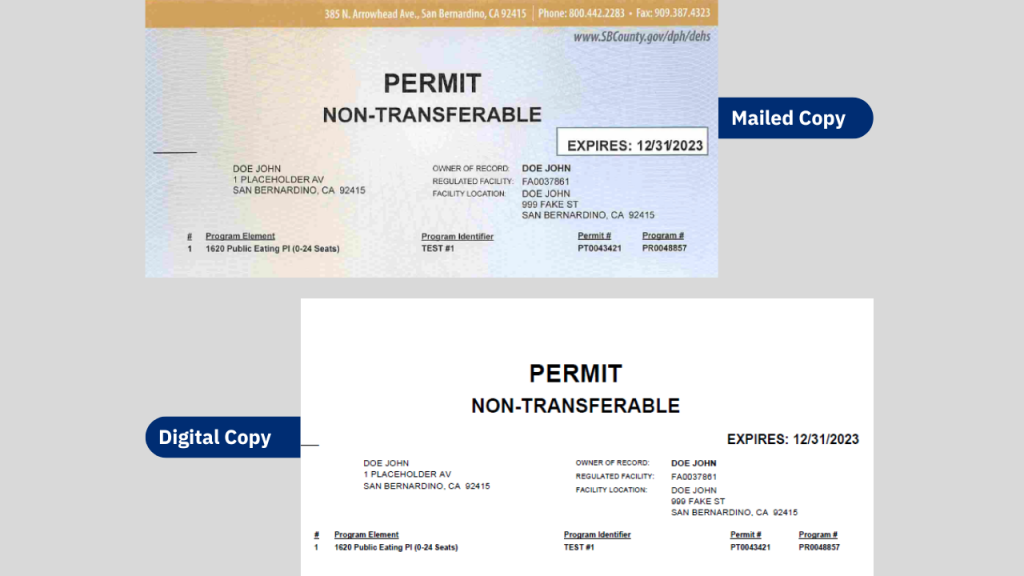
Health Permit
With your health permit from EHS, you receive two yearly inspections to make sure that your operation is following food safety procedures. By obtaining your health permit, you become a safe and responsible source of food for our County.
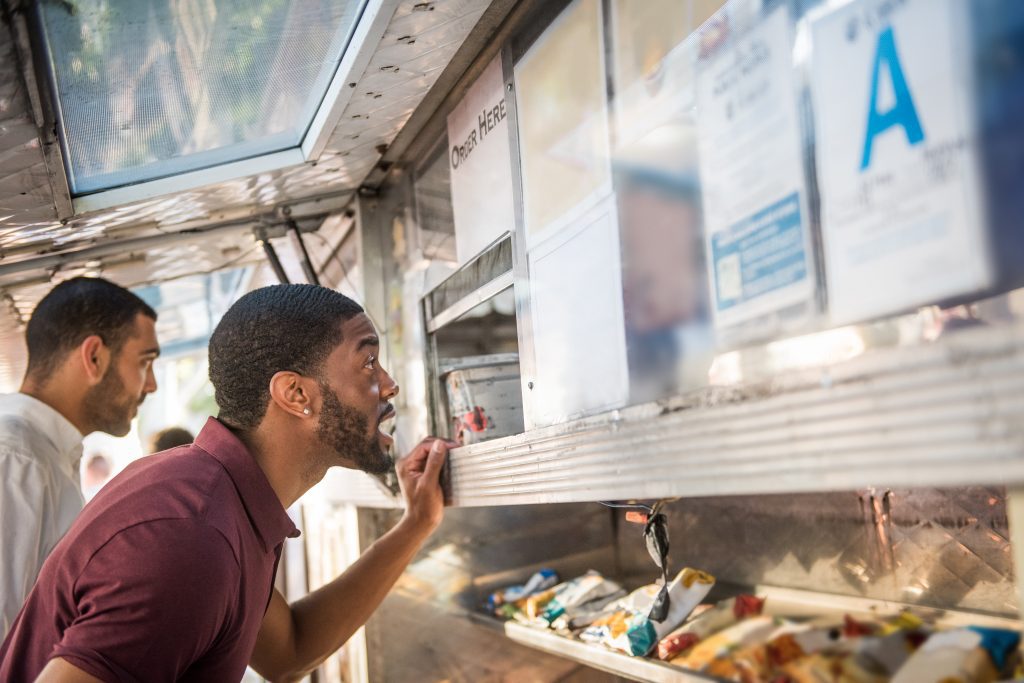
Mobile Food Facility
- We conduct inspections for trucks and trailers food is being stored, prepared, cooked, dispensed, and portioned for food safety and sanitation.
- We review plans and inspect construction for trucks and trailers.
- Investigate complaints of suspected foodborne illnesses, unsanitary conditions, operating outside of the scope of their permit and other imminent health risks.
- Provide consultations for transfer of ownerships.
What We Do
View the flowchart below to help you find out what health permit you need.
Once you have determined the health permit you need, complete the requirements for your food operation before you submit the health permit application.
Keep reading below to see details about each type of Mobile Food Facility (MFF) operation.
Food Vehicle (Truck/Trailer)
A food vehicle is a type of motorized, or nonmotorized conveyance towed by a motorized vehicle, usually occupied by a worker and is usually a truck or a trailer. Depending on the approved plans and health permit, extensive food preparation may be conducted. This type of operation has the most health and safety requirements including its own power source, mechanical refrigeration, and multiple sinks with hot and cold running water. It also allows for expanded food production and full preparation of food. This gives vendors the most options to selling or giving away food. (CalCode Chapter 10)
An approved plan from the Plan Check program, a valid health permit, an Authorization for Use of Restroom Form, and an approved commissary agreement are required for all food vehicles where food is prepared, or potentially hazardous food is being sold or given away. All of these must be obtained prior to operation.
Cart/Compact Mobile Food Operation (CMFO)
Senate Bill 972 (SB 972) provides a new option known as the Compact Mobile Food Operation (CMFO) for mobile food facility street vendors. This is a specialized cart that requires a consultation with our Plan Check program, and a valid health permit where food is prepared, or potentially hazardous food is being sold or given away.
A Compact Mobile Food Operation (CMFO) is a mobile food facility that operates from a person or from a pushcart, stand, display, pedal-driven cart, wagon, showcase, rack, or other nonmotorized transport. CMFOs can conduct limited food preparation of nonpotentially hazardous and potentially hazardous food.
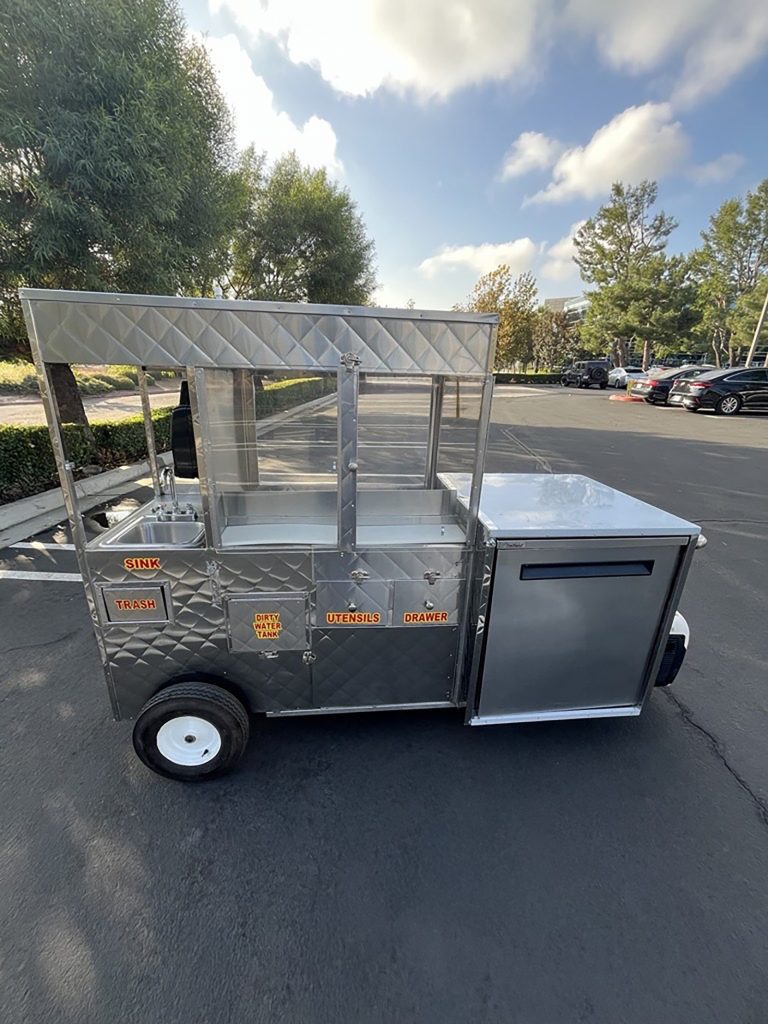

Wholesale Food Facilities
Wholesale food facilities include processors, warehouse/distribution centers, cold storage food facilities, food salvagers, food carts and food vehicle commissaries.
What We Do
- Inspect locations where food is stored, cooked, baked, mixed, roasted, portioned, assembled, processed, packaged, bottled, canned, manufactured, salvaged, including beer, wine, alcoholic beverages, and ice for food safety and sanitation.
- Investigate complaints of suspected foodborne illnesses, unsanitary conditions and other immediate health risks.
- Review plans and inspect construction for wholesale facilities and provide consultations for transfer of ownerships.
FAQs
Charitable Feeding Operations
What We Do
Limited-Service Charitable Feeding Operations (LSCFOs) are charitable operations that provide small-scale/limited food preparation and serving, specifically to feed those in need. Prior to the passage of AB 2178, laws for LSCFOs required that these organizations apply for a full environmental health permit, pay annual fees and build their kitchens to the same standard as a restaurant commercial kitchen.
AB 2178 now allows these organizations to register and abide by the Best Management Practices (BMPs) of their major food bank partner (if they have one) or that of the Environmental Health Services (EHS) in lieu of an operating permit.
Learn How your Facility can Donate Food
Did you know that in the United States 40% of food produced goes uneaten? That is 62.5 million tons of wasted food every year. Meanwhile, there were 42.2 million people, including 13.1 million children, who did not have enough food to lead a healthy, active lifestyle in 2015. While reducing hunger in the US will require addressing the root causes of poverty, donations of wholesome, fresh food can be an important strategy to addressing the immediate needs of millions of Americans.
You can help reduce food loss, and feed those in need by donating your surplus food. Donors are protected under the Federal Bill Emerson Good Samaritan Food Donation Act and the California Good Samaritan Food Donation Act (AB 1219).
The benefits of donating surplus food include, but are not limited to: Community investment and support, corporate image, tax incentives, reduced impact on local landfills, the environment, the planet, and strategy to meet state mandates such as AB 1826.
Charitable Feeding Operations Training Module
Volunteers and staff who handle food for charitable feeding operations are encouraged to take this Charitable Feeding Operations food safety training module. This free course is intended to train the public on how to keep food safe and prevent the spread of foodborne illness. Training is available in English and Spanish and the course is 22 minutes long. This module will not provide you with a Food Handler Card. Please refer to the Food Handler Training and Test to obtain an official Food Handler Card.
Food Establishment Donor Survey
The purpose of this survey is to learn about current food recovery and food waste reduction efforts and struggles throughout San Bernardino County. Your establishment’s feedback will help us identify barriers and opportunities, and how Public Health can help.
Limited Service Charitable Feeding Operations Requirements
Resources
Please reference the California Retail Food Code – Chapter 4 for the General Food Safety Requirements
Charitable Feeding Map – Find a registered organization that accepts your excess food donations!
Assembly Bill No. 1219 Legislation – Legislation as it relates to Food Donation.
Safe Surplus Food Donation Toolkit – Guide which provides information on food donation and best management practices.
Additional Resources
Edible Food Recovery (SB 1383)
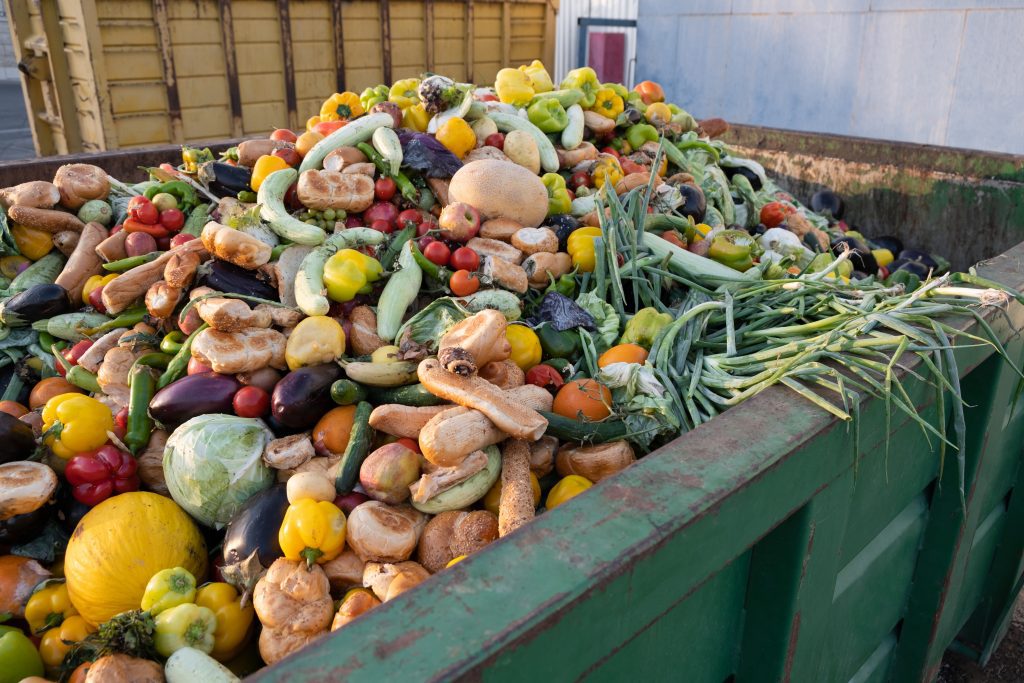
What is Edible Food Recovery?
To combat the environmental effects of greenhouse gases from organic waste in landfills, the State of California began implementing organic waste recycling and surplus edible food recovery under Senate Bill (SB) 1383 in 2022. Under SB 1383, California’s Department of Resource Recycling and Recovery (CalRecycle) established a set of statewide regulatory standards to reduce emissions of Short-Lived Climate Pollutants (SLCPs) to help prevent climate change. Organic waste such as food, food-soiled paper waste, green waste, landscaping waste, and nonhazardous wood waste often end up in the landfills and emit SLCPs when it decomposes. The law aims to fight climate change by reducing the amount of organic waste that reaches landfills by 75% by 2025.
To reduce food waste and help address food insecurity, SB 1383 requires that California will recover 20 percent of edible food that would otherwise go to waste to feed people in need. Feeding hungry people through food recovery is the best use for surplus food and a vital way for California to conserve resources and reduce waste thrown in landfills. As part of this effort, certain food-generating businesses are required to donate any surplus safe-to-eat food to local food banks and soup kitchens instead of sending food to the landfill. These food businesses required to recover excess edible food are identified as Commercial Edible Food Generators (CEFGs). The organizations that recover food are known as Food Recovery Organizations (FROs) and Food Recovery Services (FRSs).
What We Do
- We conduct compliance inspections of food businesses required to recover surplus edible food and of organizations that recover food from those business to feed those in need. Starting in 2024, we will begin enforcement and issue citations for violations observed.
- We educate CEFGs, FROs, and FRSs about food recovery requirements and practices that reduce waste and promote safe food recovery.
- We investigate complaints of suspected “donation dumping” and other practices that would prevent safe food recovery.
- We help to strengthen networks of local CEFGs, FROs, and FRSs to facilitate recovery to the food insecure in our community.
- We communicate local food recovery efforts to CalRecycle towards meeting statewide pollution reduction goals.
- We collaborate with local cities to assess existing and future food recovery capacity for San Bernardino County as a whole and to help determine where jurisdictions can apply resources to increase capacity if needed.

Commercial Edible Food Generators
SB 1383 food recovery regulations require certain food businesses, Commercial Edible Food Generators (CEFGs), to work with Food Recovery Organizations (FROs) and Food Recovery Services (FRSs) to recover surplus edible food and serve people in need.
CEFGs fall into two categories, Tier 1 and Tier 2. This tier system allows businesses and jurisdictions more time to prepare to expand or build new food recovery infrastructure and capacity to donate foods that are harder to safely store and distribute.
Tier 1 food generators (requirements effective January 1, 2022):
- Supermarket (with revenue greater than or equal to $2 million)
- Grocery store (with square footage greater than or equal to 10,000)
- Contracted food service provider (for universities, employee cafeterias, airlines, etc.)
- Food distributor
- Wholesale food vendor
Tier 2 food generators (effective since January 1, 2024):
- Restaurant (with greater than or equal to 250 seats or 5,000 square feet)
- Hotel (with on-site food facility and greater than or equal to 100 beds)
- Large events and venues
- State agency with cafeteria (with greater than or equal to 250 seats or 5,000 square feet)
- Public and private schools (with on-site food facility)
Is My Food Business a CEFG?
If a business meets one of the above definitions, they are required to donate surplus edible food. If your business does not qualify as a CEFG, business owners are still encouraged to donate their safe-to-eat surplus food to local recovery organizations. This is an excellent way to help those in our community from going hungry and help our state reduce the harmful effects of short-lived climate pollutants and climate change.
More guidance on identifying CEFGs is available through CalRecycle’s Guidance for Jurisdictions: How to Identify SB 1383 Commercial Edible Food Generators. EHS can also provide additional assistance in determining whether your business is a CEFG. For inquiries, please contact the Edible Food Recovery Program at ehsfoodrecovery@dph.sbcounty.gov or call us at (800) 442-2283.
CEFG Requirements
CEFGs are required to arrange to recover the maximum amount of edible food that would otherwise be disposed of, establish written agreements with FROs and FRSs for recovery, maintain donation records, and not intentionally spoil edible food. Inspections are conducted annually to verify compliance.
CEFGs must maintain the following documents available:
- Recovery Records which include:
- Quantity of food in pounds per month, collected by or self-hauled to each FRO/FRS.
- Types of food donated to each FRO/FRS.
- Established schedule of frequency of food that will be collected or self-hauled to the FRO/FRS.
- Written Agreements/Contracts with the partnered FRO/FRS that includes:
- Language stating the CEFG agrees to donate food to the FRO/FRS.
- Name, address, and contact information for each FRO/FRS the site donates to.
- Signatures from both parties.
- Training Records for employees with food recovery duties.
- Examples can include written procedures, PowerPoint presentations, flyers, or other documents for training employees on company food recovery protocols, what is deemed acceptable/not acceptable to donate, how to transport and store recovered food, etc.
See CEFG Resources below for forms, templates, local FRO lists, and other resources to help your business meet its food recovery requirements.
Food Recovery Organizations
A Food Recovery Organization (FRO) is an entity that engages in the collection or receipt of edible food from the CEFG and distributes that edible food to the public for food recovery either directly or through other entities including, but not limited to:
- A food bank as defined in Section 113783 of the Health and Safety Code;
- A nonprofit charitable organization as defined in Section 113841 of the Health and Safety Code; and
- A nonprofit charitable temporary food facility as defined in Section 113842 of the Health and Safety Code.
Edible Food Recovery regulations considers charitable feeding organizations, food pantries, food banks, and other organizations that recover excess food from CEFGs, Food Recovery Organizations.
FRO Requirements
FROs will be inspected annually to ensure they are distributing the maximum amount of excess edible food and to ensure they are keeping records of how much food they received.
FROs must maintain the following documents available:
- Recovery records which include:
- Name, address, and contact information for each CEFG that the organization receives edible food from.
- Quantity in pounds of edible food received from each CEFG per month.
- Name, address, and contact information for each FRS that the organization receives edible food from for food recovery.
Annual Reporting
FROs must report the total pounds collected in the previous calendar year to the jurisdiction where their primary address is physically located. Environmental Health Services will be requesting this information annually during the FRO inspection.
Want more information?
Visit the California Department of Resources, Recycling, and Recovery (CalRecycle) for more information on Edible Food Recovery (SB 1383).
Food Recovery Services
A Food Recovery Service (FRS) is a person or entity that collects and transports edible food from a CEFG or FRO or other entities for food recovery.
FRS Requirements
FRSs are required to maintain records of the edible food they receive from CEFGs or FROs. FRSs will be inspected annually to verify recordkeeping.
FRSs must maintain the following documents available:
- Recovery records which contain:
- The name, address and contact information for each CEFG that the service collects edible food from
- The quantity in pounds per month of edible food collected from each CEFG per month
- The quantity in pounds per month of edible food transported to each FRO per month
- The name, address and contact information for each FRO that the service transports edible food to for food recovery
Annual Reporting
FRSs must report the total pounds collected in the previous calendar year to the jurisdiction where their primary address is physically located. Environmental Health Services will be requesting this information annually during the FRS inspection.

Want more information on organic waste recycling?
Visit the Solid Waste Management Division page and find out who your waste hauler is!
Home Generated Food Waste
Most people don’t realize how much food they throw away every day, from uneaten leftovers and spoiled produce to parts of fruits and vegetables that could be eaten or repurposed. One-third of all food in the United States goes uneaten. Preventing food from going to waste is one of the easiest and most powerful actions you can take to save money and lower your climate change footprint by reducing greenhouse gas emissions and conserving natural resources. For information on preventing food waste at home, visit the EPA Preventing Wasted Food at Home page.

Cottage Food Operations
A Cottage Food Operation is an enterprise at a private home where certain nonpotentially hazardous food products are prepared and packaged for sale to consumers. This type of food facility only allows for one full time employee and there are two types of permits:
- Class A – allows for direct sales with a $75,000 cap per year.
- Class B – allows for both direct and indirect sales with a $150,000 cap per year.
What We Do
- Conduct inspections for Class B permit holders.
- Conduct complaint investigations for Class A and Class B permit holders.
- Review Cottage Food Applications.
- Ensure applicants comply with the nonpotentially hazardous food limitations set by the California Department of Public Health.
Temporary Food Facilities & Community Events
Temporary Event Health Permit Is For:
- Temporary food facility (TFF) vendors
- TFF event organizers
- Temporary body art vendors
- Temporary body art event organizers

Other Food Facilities
- YOUTH SPORTING SNACK BARS FOR EVENTSYOUTH SPORTING SNACK BARS FOR EVENTS

- COMMUNITY FOOD PRODUCERSCOMMUNITY FOOD PRODUCERS
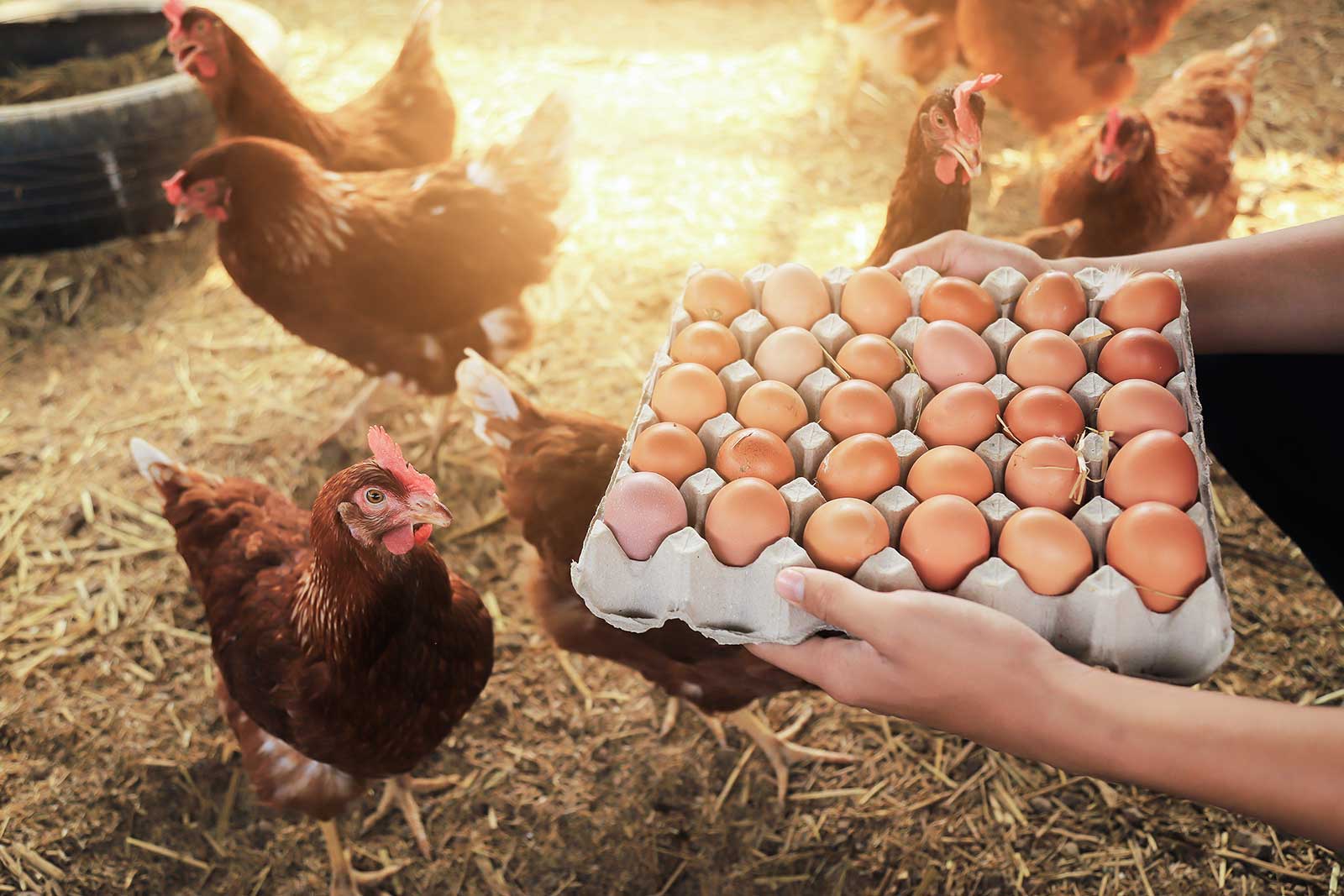
Beginning January 2015, all youth sports snack bar operations that prepare, sell and/or distribute food to the public will have to be inspected and permitted by Environmental Health Services (EHS). Per the California Health & Safety Code §113713, EHS is the responsible agency for enforcing all food protection laws of the state within the County of San Bernardino. Operations at snack bars must meet applicable state requirements to ensure food handling practices are performed in a safe manner.
A Community Food Producer includes any:
- Culinary, community, personal, or school gardens
- Egg producers that supply produce or eggs to food operations or directly to the public and are regulated by Environmental Health Services
Community food producers may sell or provide whole, uncut fruits or vegetables or unrefrigerated shell eggs directly to the public, to a permitted restaurant or a Cottage Food Operation if they meet all requirements imposed.
- Egg production is limited to 15 dozen eggs per month.
The purpose of these guidelines is to help minimize microbial food safety hazards for fresh produce. By using Best Management Practices (BMPs) for California Small Farm Food Safety as described by the California Department of Food and Agriculture (CDFA).
The BMP documents can be found in the California Small Farm Food Safety Guidelines. All Community Food Producers are required to complete the Community Food Producer Registration Form below and return it to EHS.
A Shared Kitchen facility is a commercial kitchen that allows vendors to prepare their food at an approved and permitted facility. These approved kitchens provide a commercial space for vendors who may be interested in beginning or expanding their business, shared kitchens may be shared by multiple food operations. Currently, there are three permitted Shared Kitchens in San Bernardino County that operate exclusively as hosts to Shared Kitchen Operators. For more information, please call 800.442.2283.
What We Do
- Inspect all shared kitchen facilities to ensure sanitation and food safety.
- Consult with restaurants seeking to establish a Shared Kitchen agreement at their facility.
- Investigate complaints for suspected foodborne illness, unsanitary conditions, and other health related concerns.
- CATERING AND HOST FACILITYCATERING AND HOST FACILITY

- MICRO MARKETSMICRO MARKETS

- VENDING MACHINESVENDING MACHINES

A catering operation is a food service that is conducted by a permanent food facility at a location other than its permitted physical location. A catering operation can work in conjunction with a host facility. A host facility can be a museum, brewery, art gallery, winery, commercial building etc. The host facility must be able to support the catering operation that provides food directly to the consumers.
What We Do
- Review catering standard operating procedures prior to the catering operations at the host facility.
- Permit host facilities and catering operations who register with EHS and follow the food safety procedures outlined in the California Retail Food Code.
- Conducts inspections for catering operations to ensure compliance with the California Retail Food Code.
- Investigate complaints of suspected foodborne illnesses, unsanitary conditions, and other health related concerns.
A micro market is a retail food facility that allows customers to purchase prepackaged fresh foods, fruits, health snacks, and beverages via unattended self-checkout kiosks. Micro markets may be in office buildings or restricted break areas where public access is somewhat restricted. A micro market is serviced on a pre-set schedule to ensure the equipment is cleaned and working properly, and food shelves and refrigerated and/or freezer units are stocked with new products.
To obtain approval for a micro market, plans must be submitted to the Environmental Health Services (EHS) Plan Check program for review and approval. After plans are approved, an on-site inspection is conducted to determine if a health permit can be issued.
What We Do
- Conduct inspections for micro markets where food is stored, sold, and dispensed to ensure food safety and sanitation.
- Review and inspect construction plans for micro markets.
- Investigate complaints of suspected foodborne illnesses, unsanitary conditions, permit violations, and other imminent health risks.
If you operate a vending machine in San Bernardino County that sells potentially hazardous foods, such as coffee or cold sandwiches, you must partner with an approved vending commissary for servicing and maintain an active health permit with EHS. However, if your vending machine only sells non-potentially hazardous, prepackaged foods, such as chips, candy, sodas, a health permit is not required.
What We Do
- Conduct inspections for vending machines that have potentially hazardous foods to ensure they are held to the California Retail Food Code standards.
- Investigate complaints of suspected foodborne illness, unsanitary conditions and other health related concerns.
- Provide health permits to vending machines that meet California Retail Food Code.
Classes
Liaison Education and Risk Network (L.E.A.R.N.) classes are free training classes based on the fundamentals of Active Managerial Control and the Centers for Disease Control and Prevention’s five risk factors that lead to foodborne illness. To view upcoming L.E.A.R.N. classes, visit our event calendar.
In addition, persons in charge of a Food Facility are encouraged to take the “Food Safety HELP for Persons in Charge” Course. This training will teach persons in charge how to utilize Active Managerial Control, or how to proactively incorporate food safety practices in their establishments to prevent the spread of foodborne illness. Upon successful completion of this course, participants will receive a certificate of completion and will have the opportunity to obtain and print a variety of food safety posters.
NOTE: This module will not provide you with a food worker card. Please refer to the Food Worker Training and Test to obtain an official Food Worker Card.
Resources
- NUTRITIONAL LABELING REQUIREMENTSNUTRITIONAL LABELING REQUIREMENTS
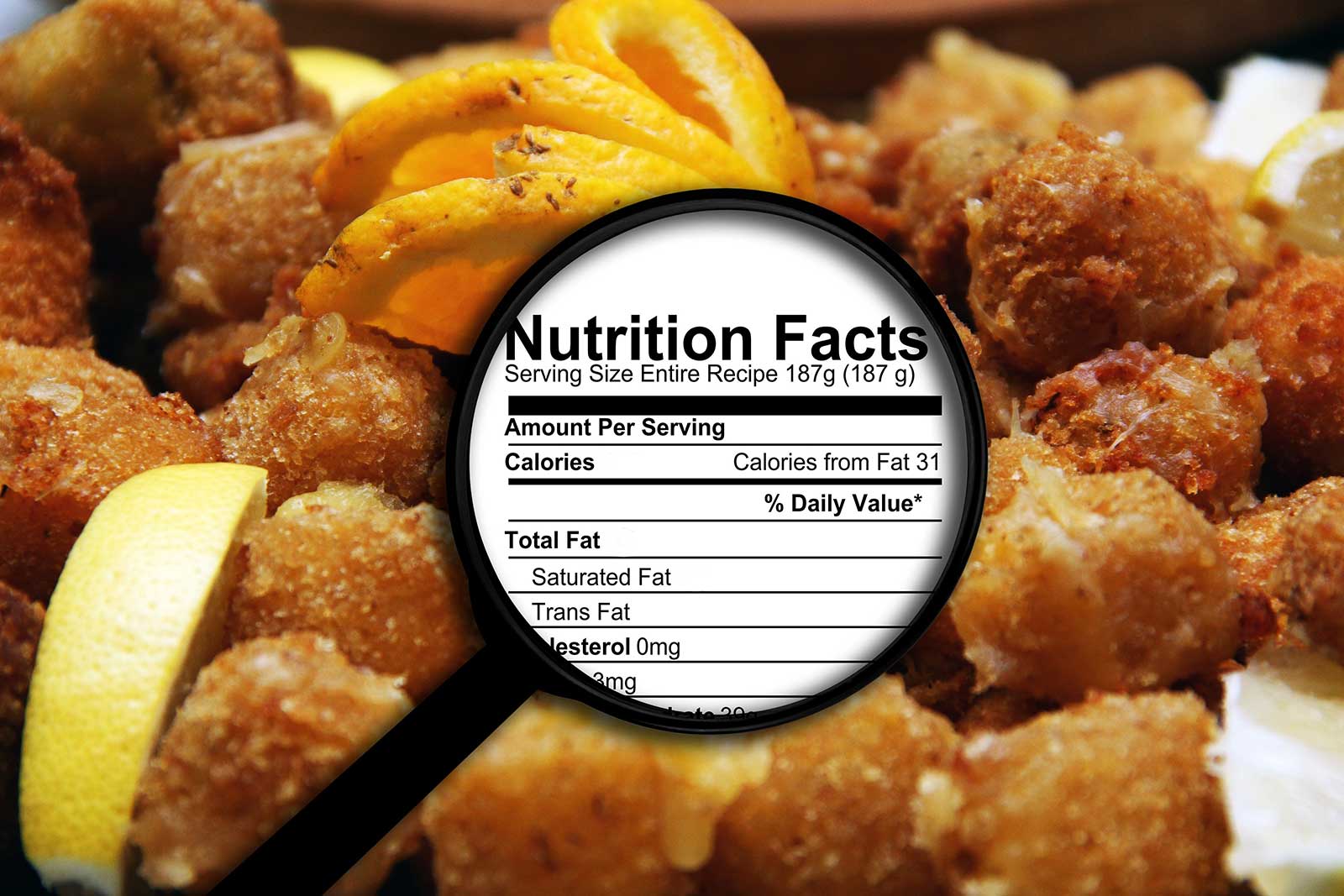
- RAW OYSTER WARNINGRAW OYSTER WARNING
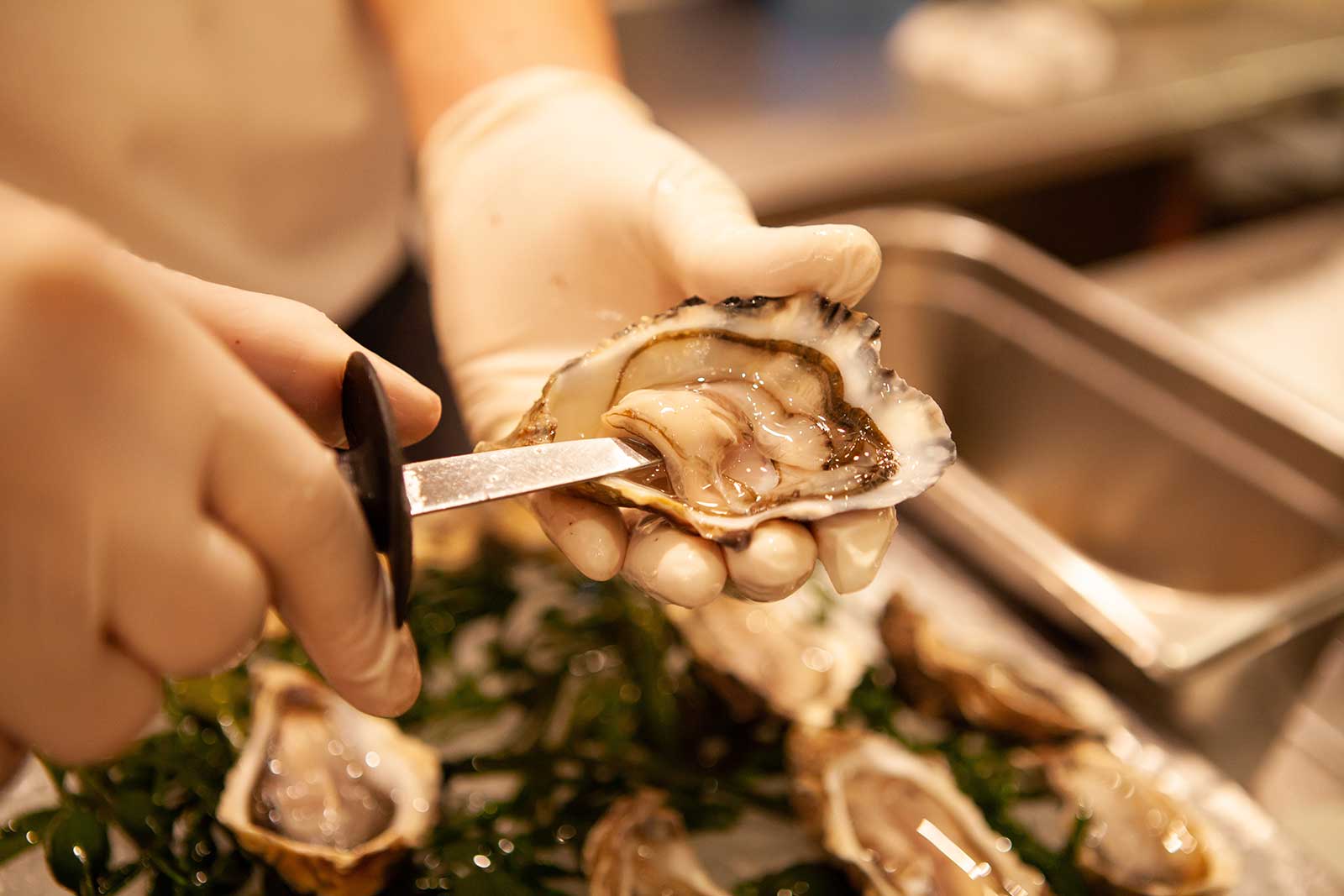
- Food Worker ResourcesFood Worker Resources

Senate Bill 20 requires that all chain restaurants (with 20 or more establishments nationwide) provide consumers with nutritional information of calorie content for all standard menu items prepared and sold as part of their establishment. Review the Menu Labeling document for more information.
The sale of raw oysters harvested from the Gulf of Mexico during April 1 through October 31 is restricted in the State of California unless the oysters are treated with a scientifically validated process to reduce Vibrio vulnificus to non-detectable levels (pasteurized). Raw Gulf oysters received during April through October that have not been processed to reduce C. vulnificus to non-detectable levels (pasteurized) are considered adulterated. Retailers receiving and selling raw Gulf oysters harvested during November through March should post the following warning sign.
Raw Oyster Warning Sign (printable for display in food facilities)


